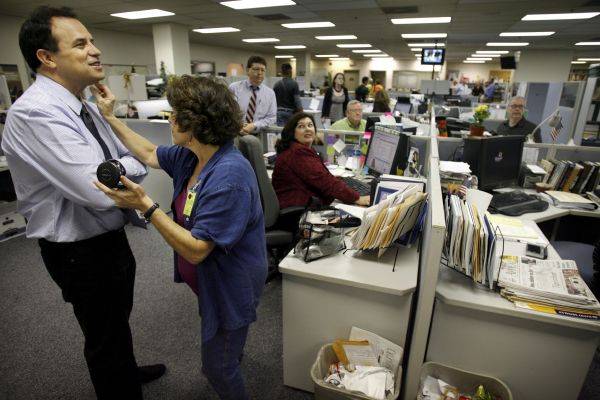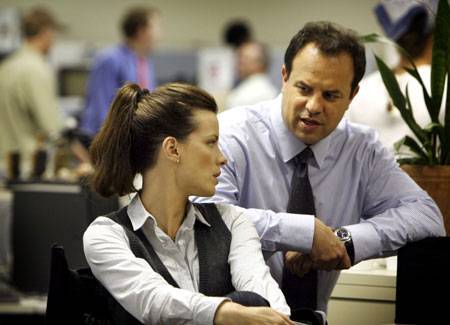 “If I had the choice to go to the film festivals in Cannes, Toronto, Sundance, or Ebertfest, and I’ve been to the first three before, I’d choose Ebertfest first.” That’s quite a statement, but once you start talking to writer/director Rod Lurie, you quickly realize that this down-to-earth guy doesn’t say anything he doesn’t mean. “I’ll tell you why,” he continues. “When I was a little boy, I worshiped film critics because they had the coolest job on earth. I wrote to Roger and he wrote back to me and I really respected that. Now, with all that he is going through, which must be a hellish experience, I respect him even more.
“If I had the choice to go to the film festivals in Cannes, Toronto, Sundance, or Ebertfest, and I’ve been to the first three before, I’d choose Ebertfest first.” That’s quite a statement, but once you start talking to writer/director Rod Lurie, you quickly realize that this down-to-earth guy doesn’t say anything he doesn’t mean. “I’ll tell you why,” he continues. “When I was a little boy, I worshiped film critics because they had the coolest job on earth. I wrote to Roger and he wrote back to me and I really respected that. Now, with all that he is going through, which must be a hellish experience, I respect him even more.
One gets the impression that it is a mutual admiration as the Urbana film critic has provided a forum for Lurie’s latest film, Nothing but the Truth, at this year’s Ebertfest, which is more than the nations movie theater chains were allowed to do. Having completed the movie and prepping for a national release, the Yari Film Group which had secured the distribution rights for the project, went belly up, derailing Lurie’s hopes for the film to be seen on a wide scale. While it being screened at Ebertfest will raise awareness a bit, the movie’s release on DVD next Tuesday will help get it in the public eye.
The fate of the film is indicative of projects of this sort, namely smart movies about serious subjects which have become box office poison in this blockbuster age. “I’ve read a couple of articles recently about how Duplicity and State of Play are not doing well and being considered bombs,” says Lurie of the recent Julia Roberts and Russell Crowe features. “The truth is they could be moderate hits in the 40 or 50 million dollar range, if they were made sensibly. When you have the stars of these kinds of films command a salary of $20 million, you’re in trouble.” Lurie knows this territory well, as his second feature, The Contender, was made for under $10 million, despite the fact that Hollywood heavyweights Jeff Bridges and Gary Oldman, as well as Joan Allen, Christian Slater and Sam Elliott were in the film’s cast. “The movie made $17 million but everyone made a mint on that film because everyone involved worked for a fraction of their usual fee, we were able to cover the budget with oversea revenues and Spielberg’s DreamWorks picked up the film for distribution. Along with DVD sales, HBO and other revenue streams, it all worked out.”

Lurie took a similar approach with Truth (the film’s star, Kate Beckinsale took only five percent of her usual fee), yet once the Yari Group went under, all of those plans went for naught. While this is a unique situation, movies such as this are in danger of disappearing because the audience that once flocked to them has mostly disappeared. “Most people go to see crap or the purely escapist fare. I go to them every once in awhile myself, but movies like All the President’s Men, my favorite film, would not stand a chance today.”
Equally troubling is the fact that newspaper movies, like Truth, are going the way of the dinosaur as well because of the current crisis facing the daily print media. Having started as a film critic, Lurie knows this arena well and how it has changed in recent years. “It’s as if I came back to the city in I Am Legend,” he says regarding the current climate of the newspaper industry. “It’s abandoned, in disarray and people are wandering around like zombies. I’ll be honest, my greatest days were as a journalist, a film critic and if I could go back to that, I would. “Unfortunately, there’s nothing to go back to. The canary in the coal mine is when papers fire their critics, political cartoonist and local sports columnists. Those are the folks that give a paper its distinct voice and once their gone you know the paper is in its death throes. The modern newspaper is dead, so all newspaper films will have to take place in the past.”
The modern media, fueled by internet blogging, instant reportage and the need to beat the competition in this electronic age presents its own set of problems, which are touched upon in Truth, namely the accuracy of the reporting being done. “The blogging and the speed with which stories are posted online is a dangerous situation,” says Lurie. “The stories they post are not always accurate and these reporters need to slow the fuck down and check their stories. In the end, someone is going to be libeled and they will sue. But what is more dangerous is that this kind of reportage makes this sort of media less and less important because people become cynical about what they see in the news, which winds up effecting us all.” Ain’t it the truth…
Nothing but the Truth will be screened at Ebertfest on Saturday night at 6:30 p.m. Lurie and actor Matt Dillon will be on hand afterwards to discuss the film.








